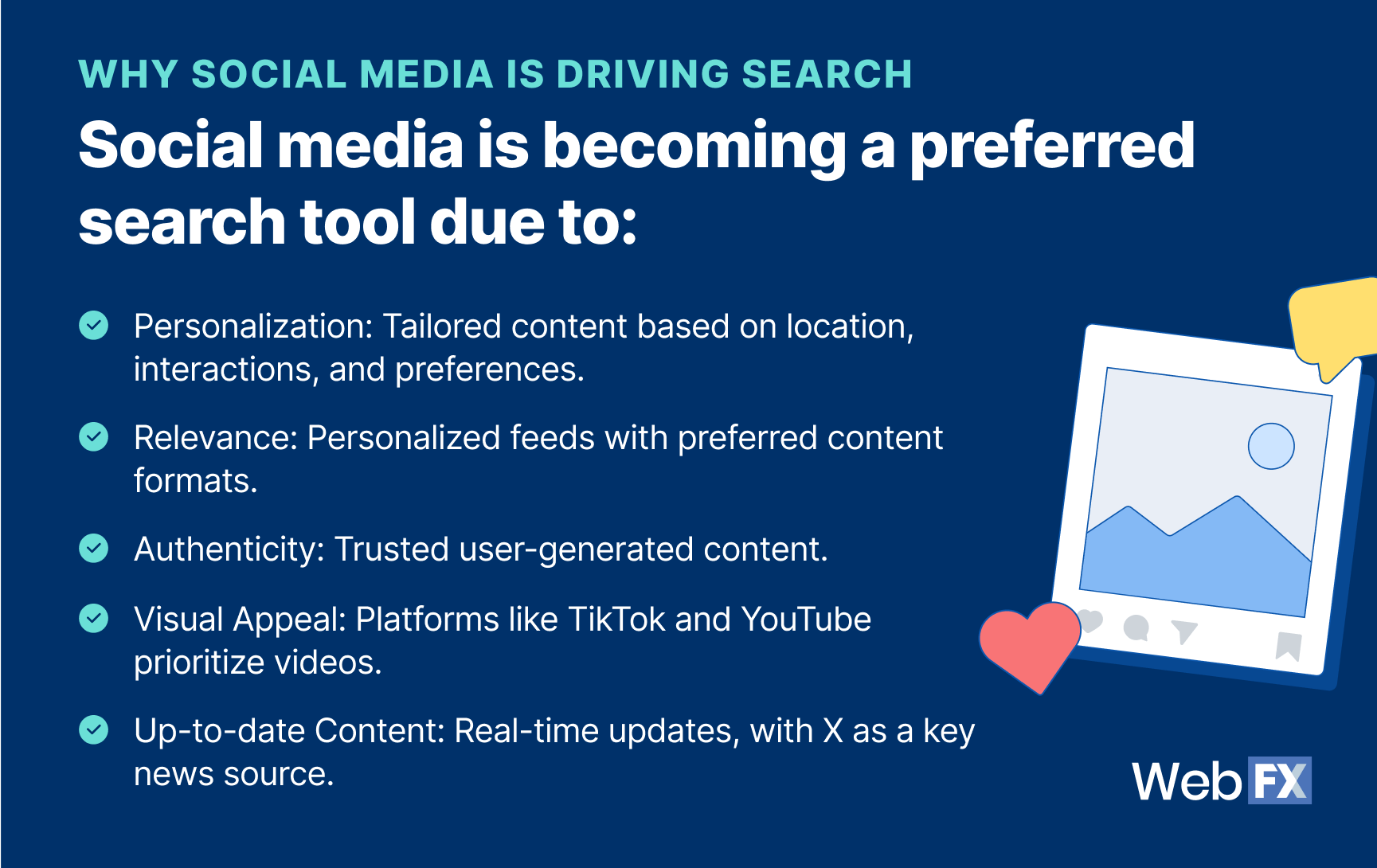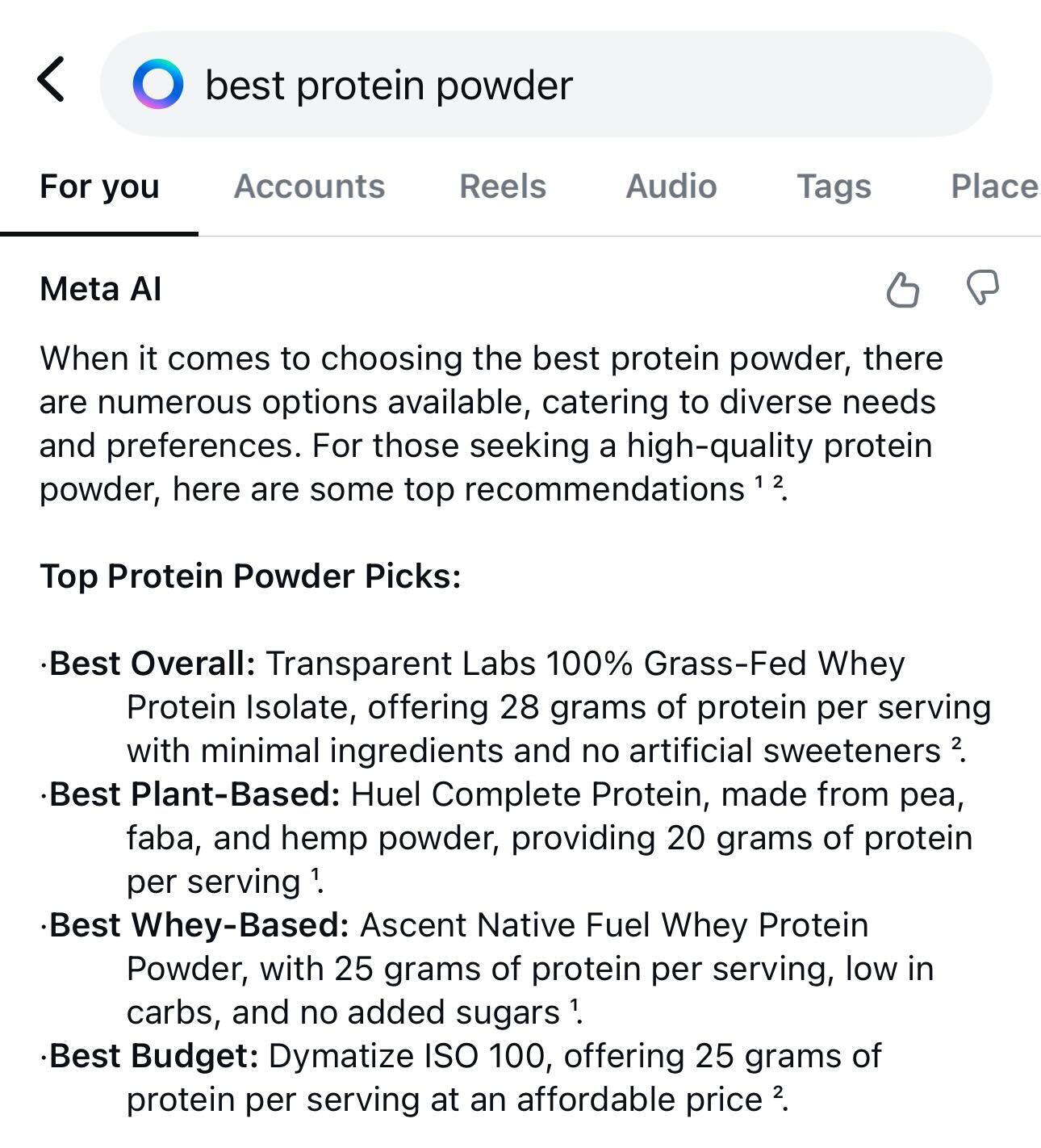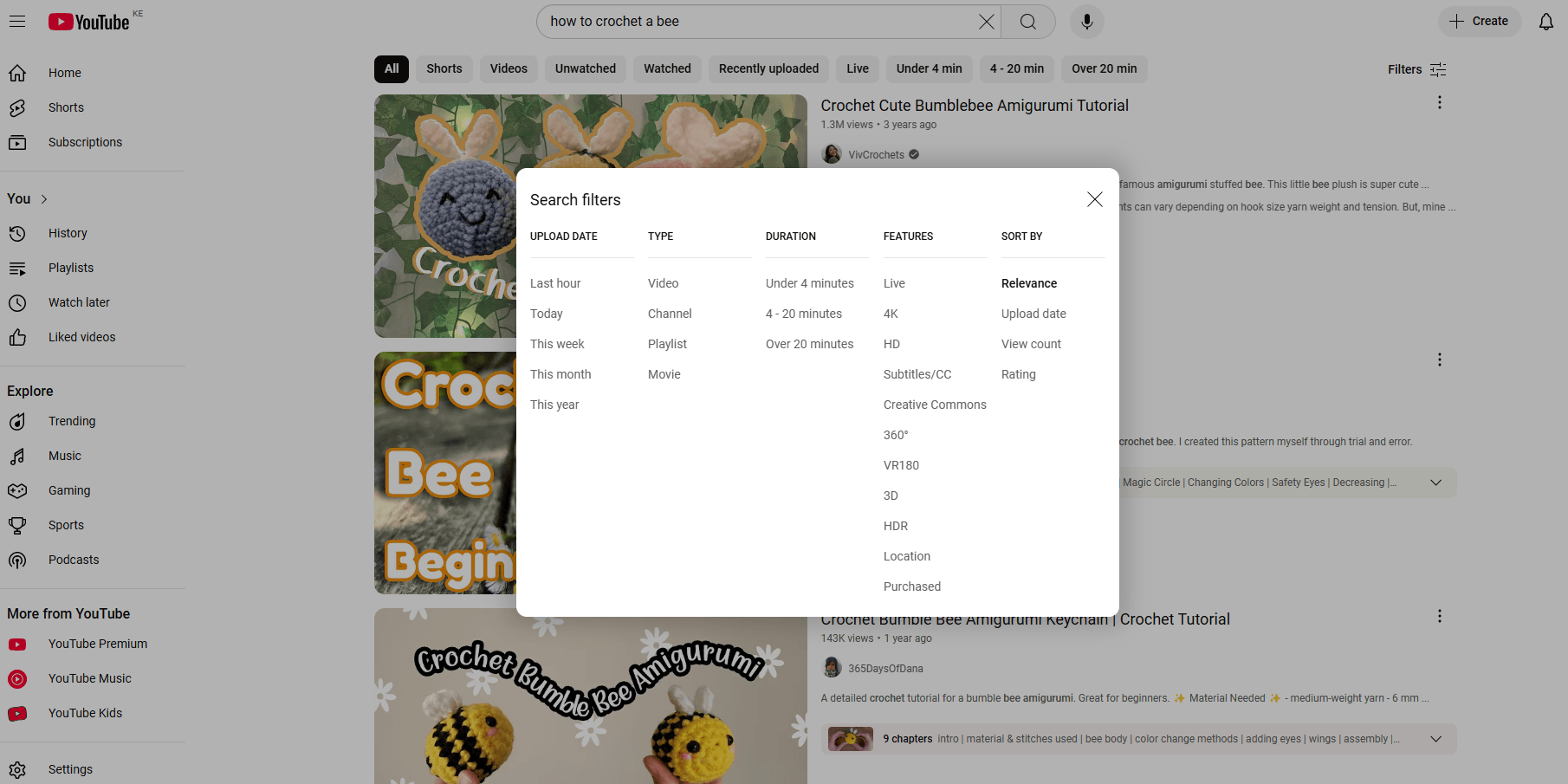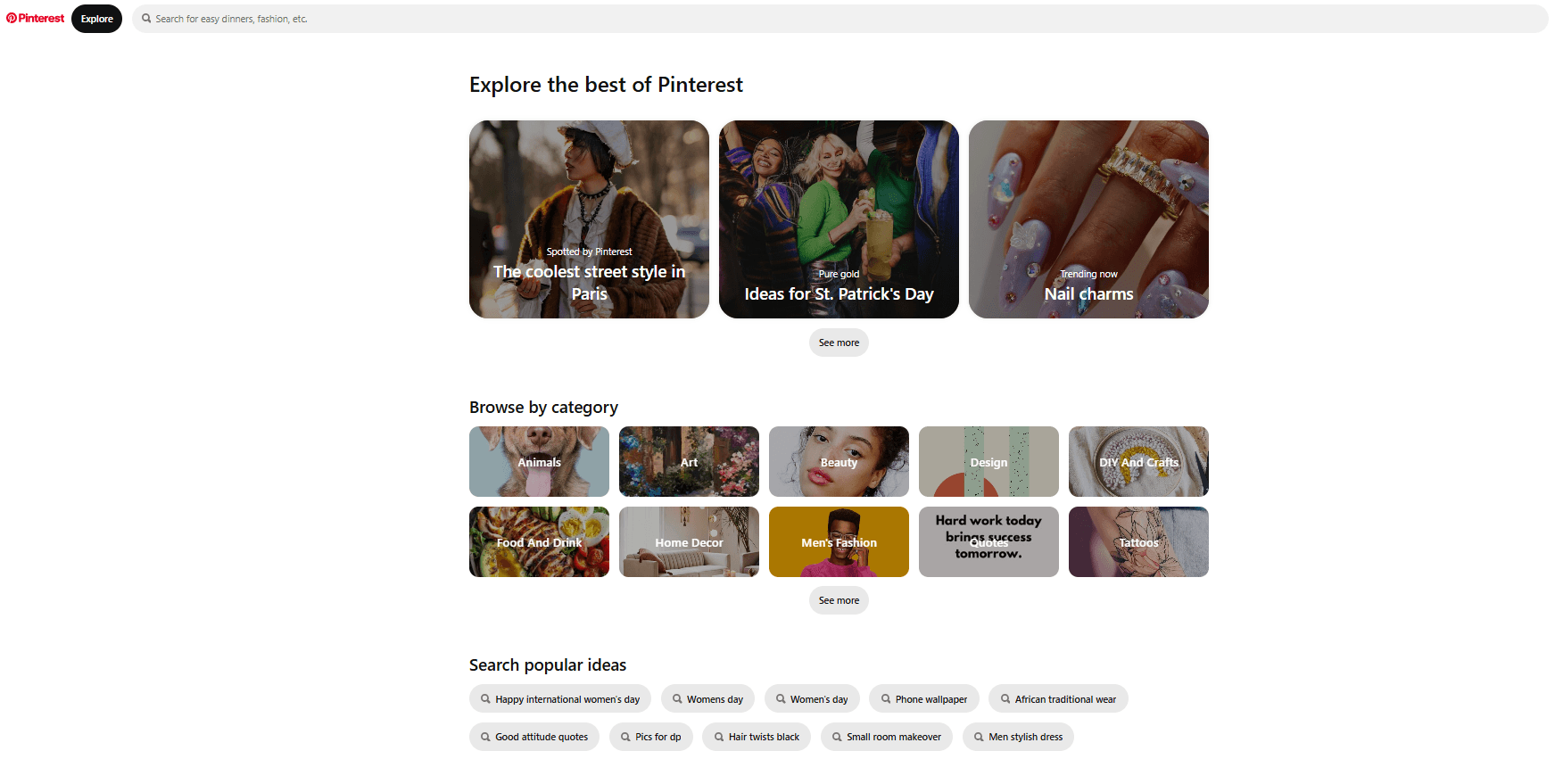- Home
- Blog
- Social Media Social Media as a Search Engine: Will Social Media Replace Google Search?
Social Media as a Search Engine: Will Social Media Replace Google Search?
-
 Published: Apr 23, 2025
Published: Apr 23, 2025
-
 8 min. read
8 min. read
-
 Lornah Ngugi
Lornah Ngugi Marketing Writer
Marketing Writer
- Lornah is a marketing writer with over six years of experience and a knack for writing unique and compelling content for a wide variety of topics in diverse industries. She has written over 400 posts for WebFX clients spanning tech, manufacturing, professional services, and other industries. She likes to start her days with a quiet outdoor walk in the park followed by a perfectly brewed cup of black coffee. There’s nothing a chocolate bar can’t fix for Lornah, from a bad mood to writer’s block.
For the last two decades, Google has dominated internet searches. However, things are changing, and they’re changing fast — social media may soon replace Google search! These traditional social media engines have been getting steep competition from social media and generative AI search engines.
The ever-growing number of mobile searches is the greatest driver of the switch to social media search. In 2025, 61.85% of web searches were made on mobile devices, excluding tablets, which is a significant increase from 48.91% in 2019.
With people now spending an average of 2.5 hours scrolling social media on their mobile devices, they find it easier to use the same sites to “Google” specific terms. Most of these platforms include a search bar where users can find information based on mention, usernames, products, services, and trends.
Let’s get into the details of the rise of social media as a powerful search engine. We’ll discuss:
- The rise of social media as a search engine in 2025
- Social media search engine adoption stats
- Key differences: Social Media vs. Google Search
- How to use social media as a search engine
- Optimizing your social media for search
The rise of social media as a search engine in 2025
Social media platforms, though initially meant for communication and connectivity, have now emerged as power search tools. According to recent statistics, 46% of Gen Zs and 35% of millennials prefer social media over traditional search engines for information searches.

There are various reasons that are driving the use of social media for search purposes:
- Personalization: Social media platforms provide users with a more targeted experience based on location, past interactions, and preferences. Personalization makes it easier for users to comprehend and digest content while helping you appear more relatable and authentic.
- Relevance: Users have personalized feeds with relevant accounts, reviews, recommendations, and purchasing options. You get answers in the format you want, whether that’s videos, text posts, or images, unlike on Google, where you must select the right answer format.
- Authenticity: Social media offers tons of user-generated content that searchers appreciate for its genuine and transparent experiences and opinions.
- Visual appeal: Unlike traditional search engines, social media search engines are more visually focused. They often present results in image and video format to appeal to different audiences.
- Up-to-date content: Social media presents users with real-time information because it takes people seconds to post. X is a popular news destination, with at least 70% of adult American news consumers admitting to having used the platform to follow live news events.
Social media search engine adoption statistics
Social media search adoption statistics help to give you a clear picture of how big a deal it’s becoming. Here are the top statistics for social media as a search engine:
- On average, 78% of internet users globally report using social media platforms for product and brand research.
- 24% of people use social media as their primary search engine.
- There’s a 25% average decline in Google searches among Gen Zs, millennials, and Gen Xers.
- 24% of survey respondents prefer social media for searching topics geared to fashion, restaurants, and sports updates.
- 55% of people prefer searching for products on social media platforms more than traditional search platforms.
- 40% of Gen Zs prefer TikTok over Google for search topics such as hair, makeup, and gift ideas.
- TikTok states that 61% of its users leverage the platform to discover new brands and products, which is 1.5x more than other platforms.
- About 83% of Instagram users use the platform to discover new products and services.
Key differences: Social media vs. Google search
Google remains the leading search engine worldwide, with an 81.95% market share. But this is changing quickly, with social media gradually rising to dominate more searches. One of the most appealing features of social media search is that each of the platforms caters to a specific type of content, topics, and demographics.
Social media searches provide users with convenience, personalization, and relevance, making it easier to digest. Contrastingly, traditional search engines often deliver tons of irrelevant results that you must sift through to choose the most relevant answers.
Here’s a closer look at the main differences between social media vs. traditional search engines.
| social media search | google search | |
| Platform goals | Creating a social experience through content discovery | Providing searches with the most accurate answers and leading them to the broader Internet |
| Real-time updates | Favors more immediate content without focusing much on accuracy and helpfulness | Favors evergreen relevant content over the latest updates |
| Search relevance | Determined by the searcher’s feed, preferences, social interactions, and pages they interact with frequency | Determined by analyzing keywords, inbound links, and content quality |
| Personalization | Searchers enjoy a more personalized experienced based on preferences, interactions, and social cues | Search results are personalized based on intent, history, location, and demographics |
| Accessibility | Different social media platforms are suitable and more accessible to different audiences | Search engines have a simple and user-friendly usable by people from different generation |
| Type of results | Results are available in a variety content, including videos, images, carousels, GIFs, and memes | More text-heavy but gradually integrating other form of content, including videos, images, and maps |
How to use social media as a search engine
The search function on social media search engines offers searchers an opportunity to find products, services, brands, and experiences. This process is possible through the search bars on the platforms that allow you to search for usernames, specific terms, hashtags, and locations.
Unlike traditional search engines, the search features on social media platforms vary from platform to platform. Some enable you to filter results, and others suggest searches based on trending topics. The individual platforms cater to a specific content type and demographic.
Here’s a breakdown of how to use different social media platforms as search engines:
You can use Instagram’s search function to find products, services, hashtags, content creators, posts, or brands. Instagram returns personalized recommendations based on a user’s interests, interactions, trends, and personalizations. There’s also an Explore page with personalized content suggestions based on user insights.

Tiktok
Did you know more than 2 in 5 Americans use TikTok as a search engine? It has an in-app search bar where users can search for keywords, sounds, music tracks, content creators, hashtags, challenges, and trends. It also allows advanced filters based on video type, upload dates, and duration to narrow down your search.

Youtube

YouTube is popular for long-form video searches across a wide variety of topics and formats, including tutorials, vlogs, reviews, documentaries, and podcasts. The YouTube search algorithm prioritizes the most popular results, and searchers can personalize results using different filters, like upload date, type, duration, and features.

Pinterest is a visually appealing search engine that searchers use to find inspiration for different projects like home decor, fashion, hair, makeup, and recipes. Users conduct searches using specific keywords and then browse through various curated boards to find the most relevant ones, which they can save for later.
Optimizing your social media for search
The shift to social media search engines means businesses must restrategize and adapt their content marketing for social media platforms. You need to start viewing social media platforms as spaces where users engage with brands, build communities, and purchase products and services.
Optimizing your social media posts for search boosts your online visibility and increases the chances that they appear in relevant search results pages. When you do it right, you’ll start enjoying a more engaged and loyal online community.
It means different things on different platforms, but here are social media optimization tips that’ll help you increase the likelihood of your posts appearing on relevant social media searches:
- Use strategic keywords in your bio, post captions, and alt text on photos and videos
- Pick a few relevant and trending hashtags for each post
- Don’t post identical content across different social media platforms
- Align your account name with your brand and add relevant links to your site
- Pin your best content to the top of the page to make it visible for longer
- Add location tags to make it easier to find content from a particular place
- Always use high-quality and high-resolution photos and videos
- Use clickable links to drive users to landing pages on your website or app
- Include buttons on your social media profiles on your website
Let WebFX help your boost your rankings in social search
With searchers moving to social media search engines, it’s more imperative than ever to have your social media profiles optimized to boost your online visibility. Social media optimization involves creating a strategy to connect with your target audience and unlock consistency across the various platforms.
We have a team of 500+ experts consisting of strategists, copywriters, and designers to help you refine your profiles to attract more followers and generate more engagement. When you partner with us, you get a dedicated campaign manager and original creative assets, such as posts and graphics that appeal to more people.
To discuss how to improve the visibility of your business during social media searches, contact us online today or call us at 888-601-5359.
-
 Lornah is a marketing writer with over six years of experience and a knack for writing unique and compelling content for a wide variety of topics in diverse industries. She has written over 400 posts for WebFX clients spanning tech, manufacturing, professional services, and other industries. She likes to start her days with a quiet outdoor walk in the park followed by a perfectly brewed cup of black coffee. There’s nothing a chocolate bar can’t fix for Lornah, from a bad mood to writer’s block.
Lornah is a marketing writer with over six years of experience and a knack for writing unique and compelling content for a wide variety of topics in diverse industries. She has written over 400 posts for WebFX clients spanning tech, manufacturing, professional services, and other industries. She likes to start her days with a quiet outdoor walk in the park followed by a perfectly brewed cup of black coffee. There’s nothing a chocolate bar can’t fix for Lornah, from a bad mood to writer’s block. -

WebFX is a full-service marketing agency with 1,100+ client reviews and a 4.9-star rating on Clutch! Find out how our expert team and revenue-accelerating tech can drive results for you! Learn more
Twitter and Facebook Status Generator
Finding engaging social media content for your business can be difficult. Use our tool to quickly find ideas and post directly to your page.
Give Me an Idea

Social Media Success Story

Proven Marketing Strategies
Twitter and Facebook Status Generator
Finding engaging social media content for your business can be difficult. Use our tool to quickly find ideas and post directly to your page.
Give Me an Idea





